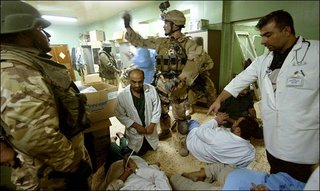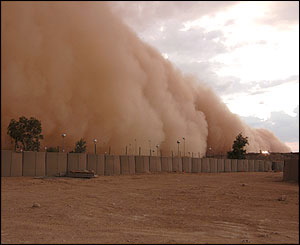 On Wednesday, as you may remember, The Lancet released a report estimating at roughly 655,000 the number of dead Iraqis who would still be alive had the USA had not invaded, destroyed, and continued to occupy their country.
On Wednesday, as you may remember, The Lancet released a report estimating at roughly 655,000 the number of dead Iraqis who would still be alive had the USA had not invaded, destroyed, and continued to occupy their country. So-called conservative supporters of the so-called president have been making specious claims such as that the number is absurd on its face and that the process by which it was obtained was flawed. As if, I suppose, a number such as this would have to absolutely correct to have any value. It's an estimate, for crying out loud, and it was announced as such. Nobody ever said it was absolutely correct.
So-called liberal opponents of the so-called president have been pointing out that the people attacking the report are doing so without any evidence or logic to support their claims, and defending the report, its methodology and its conclusions. All this is remarkably easy to do, since the report seems quite solid and the attacks against it seem so flimsy.
I haven't read up the entire left side of the blogosphere on this, but I have checked out most of the usual suspects, including Gandhi at Bush Out and Glenn Greenwald at Unclaimed Territory, and I've seen all sorts of discussion from all sorts of angles. And rightly so, in my opinion. There's clearly a lot to talk about. Greenwald makes as much sense as anyone I've read on this topic lately. But I really don't think he gets it.
Counting Iraqi deaths
Nobody disputes that the survey used scientific methodology to reach its findings, although everyone recognizes there is inherent uncertainty in counting the number of civilian dead in a war zone, and even the researchers themselves acknowledge a huge margin of error.Fair enough. Better than that. But...
Whether entirely accurate or not, there is no question that there are tens of thousands of Iraqi civilians at the very least who have died as a direct result of our invasion and, in that regard, the study underscores a critically important point about the nature of our ongoing occupation. In most wars, the number of dead on the "other side" is a secondary consideration. If anything, the objective often is to inflict as much damage as possible on the enemy's population in order to force their government into submission. In many traditional wars, especially modern wars, a high death toll would be an indicator of success, not failure.What is this talk of "victory"? Kudos for the quotation marks, but what does "victory" mean in this context?
But the opposite is true with the war we are waging in Iraq. Ever since the "threat" rationale for the war vanished (that Saddam had WMDs which would be used against us), the principal, if not exclusive, "justification" for the war was that it would improve the situation of the Iraqi people. Achieving that, so the argument goes, is both morally right and a significant boon to our own security, since improving public opinion of the U.S. in the Muslim world is critical to enhancing our influence and undermining Al Qaeda recruitment efforts. That rationale transforms Iraqi anger towards our war effort from what it would be in most normal wars (an irrelevancy, or even something to be desired) into the greatest impediment to "victory."
How does this qualify as a different kind of war? Just because the administration says it is?
As for undermining al-Q'aeda recruitment efforts, what difference does it make? -- or more properly, how can we hope to undermine al-Q'aeda, when al-Q'aeda is connected to ISI is connected to MI6 is connected to CIA?
How can we even talk about undermining al-Q'aeda's recruitment efforts when we have a deliberate plan -- formulated in the Pentagon and operational since last spring, if not earlier -- to infiltrate and incite terrorist groups?
The fact that there were no weapons to eliminate made the war useless.What do you mean, useless? The so-called weapons were only a pretext -- and a flimsy one at that! This war is being fought for a very clear purpose, and it is extremely useful to certain people, and it's up to people like us to find that purpose and those people, and expose them.
There's nothing at all to be gained by calling this war "useless"? I disagree with Glenn Greenwald about this and so many other things. And that scares me, because he's regarded as one of the best the left side of the blogosphere has to offer.
The fact that we have created extreme, uncontrollable chaos -- which provides a vacuum which the Iranians and Al Qaeda are happily filling -- makes the war dangerous.All wars are dangerous. The fact that we have created extreme, uncontrollable chaos is bad enough. The fact that we have done it deliberately is infinitely worse.
And the fact that huge numbers of Iraqi civilians continue to die as a direct result of our ongoing occupation and want us to withdraw immediately makes the war completely counter-productive even when measured against the objectives which the administration currently claims are the ones which justify the war in the first place.But this is exactly my point, Glenn. Why should we measure anything against the objectives currently -- or ever! -- provided by the administration? Why do we need to stay in their frame?
We are not even close to leaving Iraq or even decreasing our troop levels by any meaningful amount. If anything, a Republican victory in three weeks would make it highly likely that the neoconservative dream of still more troops would be fulfilled. The trend of violence and death in Iraq is unquestionably worsening, and not only do we achieve nothing by staying, but the situation in Iraq worsens every day -- not just for Iraqis but for our own security.This has nothing to do with our own security except in the sense that it is being used as an object of fear-mongering in order to convince us to give up our Constitutional rights in the name of safety and security -- never mind the fact that our true security -- as individuals and as a nation -- is to be found in the zealous protection of those rights!
The invasion of Iraq is one of the greatest strategic disasters in our country's history, and this new survey, independent of morbid and inconsequential quibbles over its accuracy, underscores why that is the case.We need to get beyond the idea that the invasion of Iraq was a strategic disaster. We need to get some clarity here. The invasion of Iraq was a deliberate and very expensive act of treason -- one of many from this administration.
And as for the study: In my view, the quibbles over its accuracy reflect a reality so grotesque that it is hardly ever mentioned, except sideways, in passing ...
Ronald Waldman, an epidemiologist at Columbia University who worked at the Centers for Disease Control and Prevention for many years, called the survey method "tried and true," and added that "this is the best estimate of mortality we have."In my view, the most important question that can be asked here -- the one that I have not seen anyone asking -- is: WHY?
This viewed was echoed by Sarah Leah Whitson, an official of Human Rights Watch in New York, who said, "We have no reason to question the findings or the accuracy" of the survey.
"I expect that people will be surprised by these figures," she said. "I think it is very important that, rather than questioning them, people realize there is very, very little reliable data coming out of Iraq."
Why is there "very, very little reliable data coming out of Iraq"?
 It's quite simple, really. Hospitals are notorious sources of enemy propaganda. From hospitals come pictures of dead and wounded people. So we attack the hospitals first. And we keep coming back to them.
It's quite simple, really. Hospitals are notorious sources of enemy propaganda. From hospitals come pictures of dead and wounded people. So we attack the hospitals first. And we keep coming back to them.After the hospitals are "secured", we turn our attention to the ambulances (to keep wounded people from gathering at the hospitals) and the journalists (to keep the stories of the dead and wounded people from being told), and of course we don't forget the television stations (to keep the stories from being disseminated).
It's all part of a very slick plan which falls under the heading of "perception management" and which so far seems to be working extremely well. The idea is, public opinion is heavily influenced by what the public perceives. Therefore the easiest way to control public opinion by controlling public perception.
Eason Jordan made a mistake a while ago, mentioned a very small part of this twisted reality last year and it cost him his job. Dahr Jamail has been talking about all these things ever since he went to Iraq, and in his view, this is his job. It takes all kinds, I suppose.
Pentagon spokesmen have admitted that part of their job is to make sure you know as little as possible about what's going on in Iraq, and what has been going on there for the past three and a half years, and what has been going on all over the world for the past fifty or sixty years ... or even longer.
 The more I read Glenn Greenwald, the more I wish he were talking about this, and about the plan of battle that the USA keeps following in Iraq, and about depleted uranium, and about two more little things that nobody seems to want to talk about, even the best of our so-called "lefty bloggers": that the "terror" we are "fighting" seems to be almost entirely bogus, and that "we" don't seem to have any intention of "winning" the war in Iraq in particular, nor the so-called War on so-called Terror in general.
The more I read Glenn Greenwald, the more I wish he were talking about this, and about the plan of battle that the USA keeps following in Iraq, and about depleted uranium, and about two more little things that nobody seems to want to talk about, even the best of our so-called "lefty bloggers": that the "terror" we are "fighting" seems to be almost entirely bogus, and that "we" don't seem to have any intention of "winning" the war in Iraq in particular, nor the so-called War on so-called Terror in general. It's a rare politician who sees the world more clearly than Glenn Greenwald.
No wonder there's nobody to vote for.
Kurt Nimmo says what Glenn Greenwald can't (or won't):
After the Democrats take back the House and the Senate, do you think anything will change? Democrats are onboard with the neocon phony war on terrorism, the occupation of Iraq, the re-invasion of Afghanistan—now that the Taliban are resurgent, not that they ever went away, as resistance to occupation is to be expected, as we can expect the sun to come up tomorrow—and the dismantlement of the Constitution, the Bill of Rights, and the construction of a police state at home. Democrats will change none of this. Democrats simply represent a new management team.